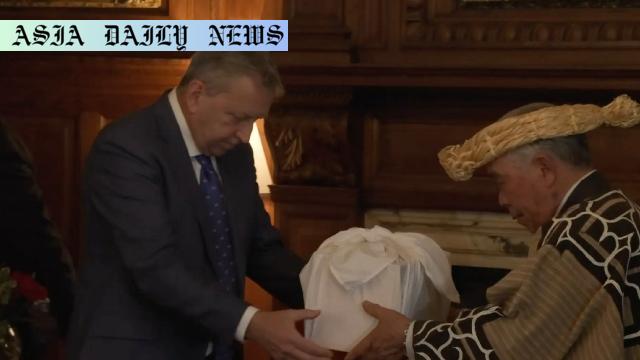Ainu remains returned to indigenous group after 110 years, honoring ancestral dignity and rectifying historical wrongdoings.
- Scotland’s University of Edinburgh returns Ainu remains after a century.
- The Ainu remains will be interred at the Upopoy National Museum in Japan.
- This move marks the third return of Ainu remains globally, following Germany and Australia.
- The Natural History Museum in London still holds some Ainu remains.

Introduction: A Historical Act of Repatriation
The ancestral remains of Japan’s indigenous Ainu people, held by the University of Edinburgh in Scotland for over a century, have finally been returned to their rightful custodians. In a ceremonial event held on Wednesday, the skulls of three Ainu individuals were handed over to representatives from Japan, including members of the Ainu Association of Hokkaido, by the university’s principal and vice-chancellor, Peter Mathieson. This symbolic and tangible gesture is a significant step in addressing historical injustices and showing respect for cultural heritage.
The Journey of the Ainu Remains
The return of these remains marks the culmination of an intention expressed by the University of Edinburgh in 2022. These remains had been initially acquired in 1913, donated by a Scottish anthropologist and physician who graduated from the University and lived in Japan. Such remains were often acquired in the late 19th and early 20th centuries under exploitative and imperial contexts. The Ainu community believed such removals of ancestral remains were acts of disrespect, separating the deceased from their homeland and spiritual traditions. This gesture of returning remains acknowledges past wrongs while giving the Ainu people an opportunity to reconnect with their ancestors.
Restoring Dignity and Acknowledging Heritage
Okawa Masaru, the executive director of the Ainu Association of Hokkaido, expressed deep emotions during the ceremony. He reflected on the pain these ancestors might have felt, having been held in foreign lands for so long. He emphasized the importance of honoring their spirits at the memorial facility, where the remains will be respectfully laid to rest at the Upopoy National Ainu Museum and Park in Hokkaido. This facility serves both as a memorial site and as a center of education and cultural exchange, preserving the rich traditions of the Ainu people for future generations.
Global Efforts to Return Ainu Remains
This repatriation is part of a broader movement to return such remains to their country of origin. Similar gestures have occurred previously, with ancestral remains being returned from Germany and Australia. The process of recovering Ainu remains is ongoing, and further initiatives are underway. For instance, the British Natural History Museum in London still holds Ainu remains, prompting the Japanese government to actively request their return. Such restitution efforts highlight the global recognition of the rights of indigenous groups to preserve their cultural and human heritage.
Significance in Bridging Histories
The return of these remains goes beyond repairing the wrongs of the past. It fosters dialogue between nations and communities and encourages a broader understanding of history and cultural respect. The collaborative efforts between the University of Edinburgh and the Ainu Association represent a commitment to preserving the dignity of indigenous cultures and their ancestors. Additionally, the return of these remains serves as an important reminder of the ethical responsibilities of museums and institutions that house such artifacts or remains.
Conclusion: A Step Toward Reconciliation
The University of Edinburgh’s action to return the Ainu remains is a monumental step in acknowledging historical wrongs and striving for reconciliation. By giving these remains back to their rightful community, the university exemplifies the significant role academic institutions can play in addressing colonial legacies and promoting cultural respect. While progress has been made, the repatriation of Ainu remains from other global institutions remains a pressing task, one that speaks volumes about the world’s evolving treatment of historical injustices.



Commentary
A Gesture of Justice and Cultural Sensitivity
The return of the Ainu remains by the University of Edinburgh holds immense historical and cultural significance. The Ainu people, long marginalized and subjected to the pressures of assimilation, deserve this restorative act of justice. By acknowledging the wrongs inflicted during a time of colonial-driven scientific research, this moment underscores the importance of redressing injustices faced by indigenous communities worldwide.
The Role of Institutions in Addressing Past Wrongs
Universities and museums play a critical role in shaping our understanding of history. Often, their collections are filled with artifacts and remains obtained under ethically questionable circumstances. The proactive step taken by the University of Edinburgh sets a precedent, encouraging other institutions to evaluate their collections and take similar measures to return items to their cultural or rightful heirs. This shows that scholarship and ethics can, and should, coexist.
The Path Toward Global Reconciliation
The global interest in the restitution of indigenous remains and artifacts showcases an era of cultural understanding and shared respect. The return of the Ainu remains not only heals old wounds but also builds bridges between nations and communities. This act reminds us of our shared humanity while energizing efforts to protect and honor the cultures and traditions that enrich our world.